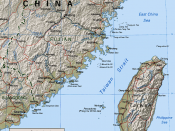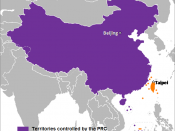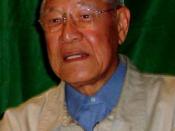A Contribution to Military Buildup in the PRC and the ROC after the 1995-1996 Taiwan Strait Crisis
Chalakorn Rattanaphan (IEPS)
JPM280: Taiwan Strait: Scenarios of Conflict
Faculty of Social Sciences, Charles University
I. Introduction
Taiwan's unresolved international status has been the cause of repeated crises in East Asia since the victory of the Communist Party on Mainland China in 1949. From that time on, the conflict between the PRC and the ROC has evolved from both side's assertion of being the only and sole legitimate government of "One China", with authority over both the mainland and Taiwan, until later when the ROC acted toward independence as a separate state from China, which resulted in many conflicts, crises, and confrontations which were not only between the PRC and the ROC but also between the PRC and other outside players namely the United States.
The 1995-1996 Taiwan Strait Crisis was interpreted as a sign of displeasure from Beijing concerning the fact that the U.S.
again interfered with the Chinese sovereignty over Taiwan questions by granting President Lee Teng-hui an entry visa to the United States. Another cause for Beijing's frustration concerned the first democratic presidential election, in which the pro-independence candidate was likely to win. Both of the incidents implied that Taiwan was moving toward its "formal" independence from the Mainland China and tried to seek its legal status on the international community. For these reasons, the PRC was utmost unsatisfied and started its military exercises including dreadful missile tests to protest such actions and to exhibit its stance on Taiwan questions, which eventually led to a crisis where the United States was drawn into.
The PRC acted provocatively toward Taiwan which coerced the U.S. to get involved. The U.S., though limited by the Sino-U.S. Communiqués, perceived the PRC a real threat...


